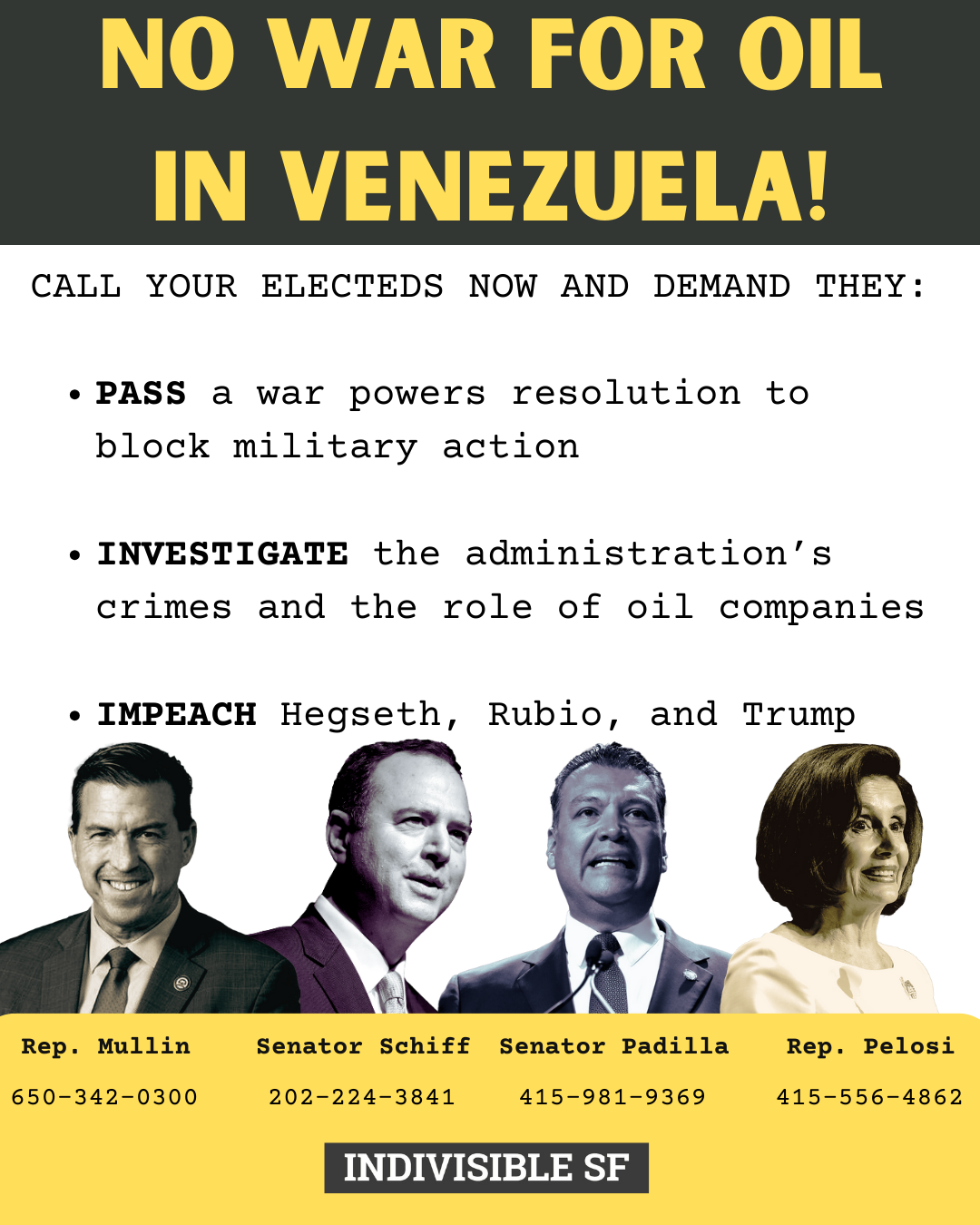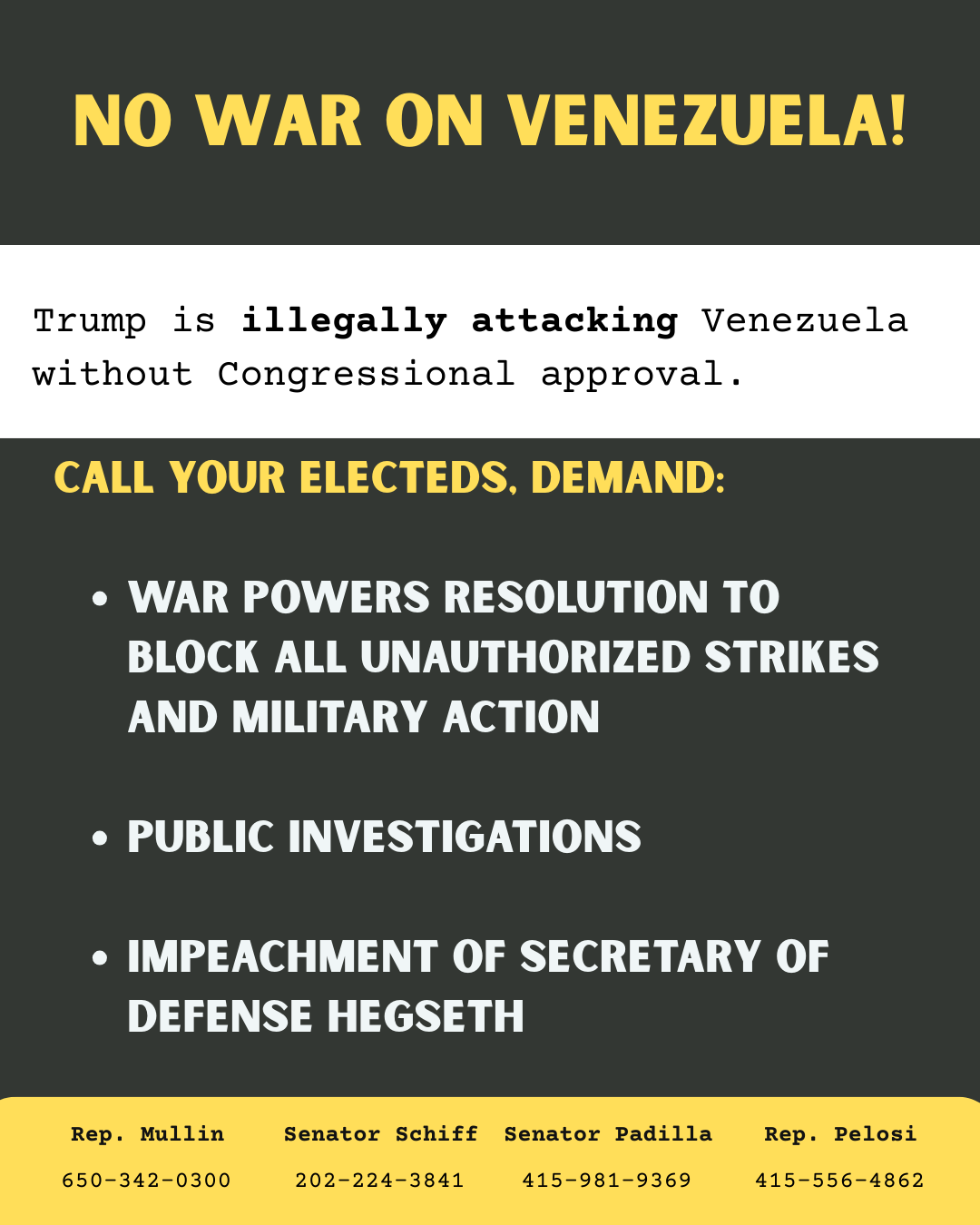Honor Dr. Martin Luther King Jr. with Action: Protect Our Voting Rights
Call BOTH of your Senators.
Contact the White House via their comment line or web form.
Hate the phone? Resistbot is your friend. Resisbot now allows you to send text directly to the White House the same as with Members of Congress. If you use Resistbot or write an email to your elected officials, make sure to use your own words. Copy-pasted emails are discounted by Congressional staff. In-depth, personal stories are most effective.
Call Script
My name is __________. I am a constituent, and my zip code is _______. I am a member of Indivisible SF.
Every senator knows Republicans’ attack on our voting rights did not end with the failed coup attempt on January 6, 2021. Between January 1 and December 7, 2021, 19 states passed 34 laws restricting access to voting, with hundreds more laws introduced to make voting more difficult, especially for voters of color and others likely to support Democrats. In some cases laws are being enacted that would allow partisan officials to overturn the will of the voters because they do not like the outcome. We have also seen increasing mob violence nationwide aimed at intimidating election officials, to further undermine our freedom to vote.
[To the President:] Please continue speaking out boldly, as you did on January 6, 2022 and in Georgia this week, about protecting our right to free and fair elections, a pillar of our democracy. Continue to publicly demand that the Senate change the filibuster so that voting rights laws can pass.
[To your Senators:] We want you to totally eliminate the filibuster. Short of that, you can at least create an exception for our essential voting rights and pass both the Freedom to Vote Act and the John Lewis Voting Rights Advancement Act.
Background
We have just marked an entire year since the most brazen attack on free and fair elections in our history. We have seen the evidence that it was not a riot sparked by a rally that just got out of hand. We have seen the 38-page presentation with plans to keep the humiliated loser in power by nefarious means.
We will never forget that radical violent attack on January 6, and we can’t help noticing that attacks on our voting rights have continued in Republican states all year. Take a look at the numbers for 2021: Between January 1 and December 7,19 states passed 34 laws restricting access to voting. More than 440 bills with provisions that restrict voting access were introduced in 49 states. State legislatures enacted far more restrictive voting laws in 2021 than in any year since the Brennan Center began tracking voting legislation in 2011. And a new trend emerged in 2021 of bills that would allow partisan actors to interfere with election processes or even reject election results entirely.
The Senate has solutions ready to go. The Freedom to Vote Act is a broad package of voting, redistricting, election security, and campaign finance reforms that would ensure minimum national standards for voting access and prevent partisans from sabotaging election results. The John Lewis Voting Rights Advancement Act would restore the power of the original Voting Rights Act, preventing discriminatory practices and rules in voting from being implemented in states and localities where discrimination is persistent and pervasive, and restoring voters’ ability to challenge discriminatory laws nationwide.
The Voting Rights Act (VRA) was passed in 1965 and has been reauthorized by bipartisan majorities in Congress five times, most recently in 2006.
Unfortunately, Republicans have been on a crusade to undermine the Voting Rights Act (VRA) for 30 years and they have been stacking the courts to support their efforts. One of the most ardent opponents of the VRA is the current Chief Justice of our Supreme Court, John Roberts:
In 1981, Roberts joined Reagan’s Department of Justice as a special assistant to the attorney general, focused on voting rights. He led the fight against a coalition of Democrats and Republicans who wanted to change Section 2 of the VRA to be sure voters could strike down discriminatory laws by proving the laws caused discrimination, whether or not the people who made the laws intended to discriminate. Intent didn’t matter; outcomes did. Roberts and the Reagan DOJ lost the case, and lawsuits about discriminatory voting laws brought under Section 2 went from three in 1981 to 175 in 1988.
Since Roberts became Chief Justice in 2005, he has chiseled away, piece by piece, at the nation’s laws for voting rights, campaign spending, and other democracy issues. Some examples:
Americans for Prosperity Foundation v. Bonta, 2021: Ruled that California’s requirement that charities disclose their biggest donors to state regulators was unconstitutional
Brnovich v DNC, 2021: Knee-capped Section 2 of the VRA, making it harder for voters to prove a law is discriminatory. He got what he’d fought for in 1981.
Citizens United v Federal Election Commission, 2010: Reversed century-old campaign finance restrictions and enabled corporations and other outside groups to spend unlimited funds on elections.
Shelby County v Holder, 2013: Made Section 5 of the VRA, requiring pre-clearance of voting laws, inoperable because it was based on an old formula.
Ruchio v Common Cause, 2019: Ruled that partisan gerrymandering claims could not be decided by the Supreme Court.
All three of our newest Supreme Court Justices, from Neil Gorsuch to Brett Kavanaugh to Amy Coney Barrett, are continuing this effort to undermine our democracy from the bench.
We the people need all the help we can get to protect our voting rights – and we clearly can’t look to the Supreme Court for it. So we need Congress and the President to act.
References
Give Us the Ballot, We Will Transform the South Martin Luther King, Jr., May 17, 1957
Voting Laws Roundup: December 2021 | Brennan Center for Justice
Supreme Court: John Roberts' War on Voting Rights Threatens Democracy - Rolling Stone, July 9, 2021
Citizens United Explained | Brennan Center for Justice , December 12, 2019
Shelby County v. Holder | Brennan Center for Justice, August 4, 2018
https://www.brennancenter.org/our-work/court-cases/rucho-v-common-cause August 1, 2019







